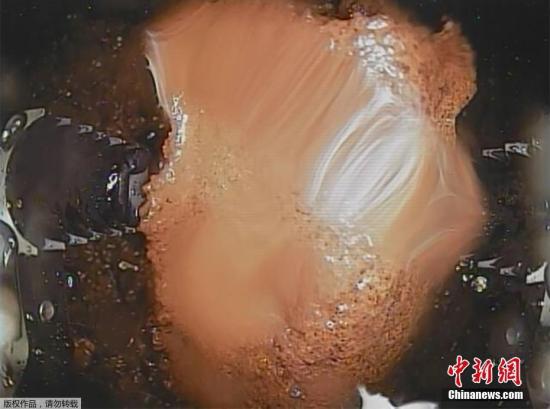China News Service, April 11th. According to a report by the Russian Satellite Network on the 11th, Vladimir Rakov, chief researcher and doctor of biology at the Institute of Pacific Ocean Research of the Far East Branch of the Russian Academy of Sciences, said that the accident occurred in Fukushima, Japan. Even if the water in the No. 1 nuclear power plant is carefully cleaned, if it is discharged into the ocean, it may still cause radioactive isotopes to remain in marine organisms, including fish, and then accumulate in the human body.
Data map: Japan’s Tokyo Electric Power Company released a picture showing that a pliers tubular device with a camera on the front "touched" the nuclear residue inside Unit 2 of the Fukushima Daiichi Nuclear Power Plant.
Earlier, according to the Japan Broadcasting Association TV station, the Japanese government may announce its decision early next week to thoroughly clean the water in the Fukushima No. 1 nuclear power plant and then dump it into the ocean.
TV sources said that the approximate date for dumping the water is 2023.
Based on the current storage rate in the storage tank, all storage devices will be full by the end of 2022.
Rakov said, “If you pour the water in a place where the seawater is well mixed, it will not cause too much attention; if you pour the water in a place where the current will flow to the coast, then the radioisotopes will enter the fish. In the body, they will accumulate on fish bones and fish meat."
According to him, it is impossible to completely remove radioactive contamination from the water at the Fukushima nuclear power plant.
The scientist pointed out, "They are atomic isotopes. For such water, no matter how clean it is, the isotopes will exist."
He said that after the Fukushima nuclear power plant accident, some short-lived isotopes may have disappeared, such as radioactive iodine; but there are some elements whose decay process takes tens of thousands or even hundreds of thousands of years.
Rakov clearly pointed out that “it is impossible to get rid of them completely. They will always exist in the concentrated material obtained from the nuclear reaction of nuclear power plants.” He also pointed out that for many marine organisms, this is before the corresponding international standards are issued. This plan to purify the water will not improve the situation.
On March 11, 2011, a serious accident occurred at the Fukushima No. 1 nuclear power plant due to a magnitude 9.0 earthquake and tsunami.
People cannot live normally around the nuclear power plant.
According to estimates from all parties, it will take about 40 years to finally clear the consequences of the accident at the station and dismantle the reactor from the time it occurs.

